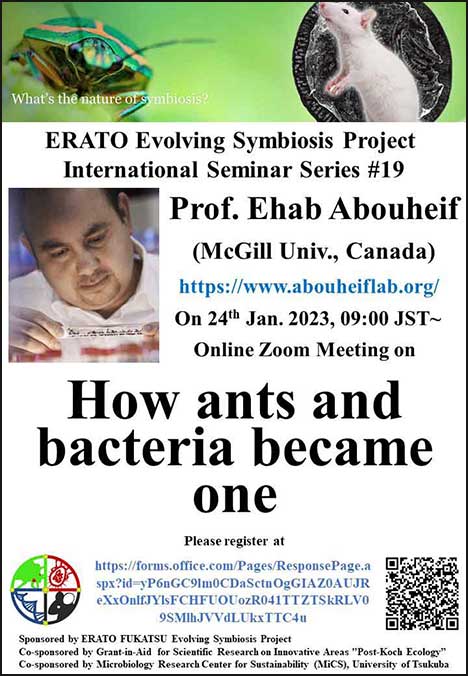第19回共生進化機構国際セミナーをオンライン開催しました。
アリ類の発生進化学的研究で知られるProf. Ehab Abouheif(McGill University, Canada) にご講演いただきました。

Abstract:Obligate endosymbiosis, in which distantly related species integrate to form a single replicating individual, represents a major evolutionary transition in individuality. Although such transitions are thought to increase biological complexity, the evolutionary and developmental steps that lead to integration remain poorly understood. Here we show that obligate endosymbiosis between the bacteria Blochmannia and the hyperdiverse ant tribe Camponotini originated and also elaborated through radical alterations in embryonic development, as compared to other insects. The Hox genes Abdominal A (abdA) and Ultrabithorax (Ubx)—which, in arthropods, normally function to differentiate abdominal and thoracic segments after they form were rewired to also regulate germline genes early in development. Consequently, the mRNAs and proteins of these Hox genes are expressed maternally and colocalize at a subcellular level with those of germline genes in the germplasm and three novel locations in the freshly laid egg. Blochmannia bacteria then selectively regulate these mRNAs and proteins to make each of these four locations functionally distinct, creating a system of coordinates in the embryo in which each location performs a different function to integrate Blochmannia into the Camponotini. Finally, we show that the capacity to localize mRNAs and proteins to new locations in the embryo evolved before obligate endosymbiosis and was subsequently coopted by Blochmannia and Camponotini. This pre-existing molecular capacity converged with a pre-existing ecological mutualism to facilitate both the horizontal transfer and developmental integration of Blochmannia into Camponotini. Therefore, the convergence of pre-existing molecular capacities and ecological interactions—as well as the rewiring of highly conserved gene networks—may be a general feature that facilitates the origin and elaboration of major transitions in individuality.
ERATO Evolving Symbiosis Project International Seminar Series #19
第19回共生進化機構国際セミナー
Sponsored by ERATO FUKATSU Evolving Symbiosis Project
主催:ERATO深津共生進化機構プロジェクト
https://www.jst.go.jp/erato/fukatsu/
Co-sponsored by Grant-in-Aid for Scientific Research on Innovative Areas "Post-Koch Ecology”
共催:新学術領域研究「ポストコッホ生態」
https://postkoch.jp/about/
Co-sponsored by Microbiology Research Center for Sustainability (MiCS), University of Tsukuba
共催:筑波大学微生物サステイナビリティ研究センター(MiCS)
https://www.mics.tsukuba.ac.jp/


